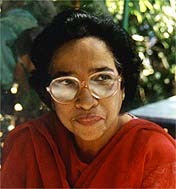Toru Dutt the young woman
who blazed across the literary firmament like a shooting star is all but
forgotten today. She was a translator and poet who wrote in English and French
in British India. Some even called her a pioneer of Indian women writing in
English.
Born Tarulatta Dutt on
March 1856, she was the youngest of three children born to Goven Chandra and
Kshetramoni Dutt. Her family was upper caste, well educated, progressive in
outlook and influenced by Western culture. Toru grew up in aa environment where
poetry was loved an appreciated. Her father too dabbled in poetry. In his
anthology “Dutt Family Album” he described Toru as “Puny and elf-like with
dishevelled tresses, self-willed and shy, intent to pay her tenderest addresses
to bird and cat, but most intelligent.”
Toru and her siblings
were privately tutored in French, English, Bengali and Sanskrit.
When Toru was six years
old, the family converted to Christianity. Because of their conversion, they
were socially isolated. So they moved to France in 1862, but returned to
Calcutta in 1864. Soon after, her brother Abju succumbed to Tuberculosis.
The family again moved to
France in 1869. Toru and her sister Aru were educated in French, History and
Arts by private tutors. Toru had a fascination for French and her favourite
authors were Victor Hugo and Pierre Jean de Beranger. Toru was the first Indian
writer in French.
The family moved to
England in 1870 where Toru studied at the University of Cambridge from 1871-
1873. Music, History and Scripture were the subjects of her choice. She was
exposed to British intellectual life and attended ‘Higher lectures for women.’
She even came in contact with women suffragettes. During her time in Cambridge
she became a friend of Mary Martin. They kept in touch even after the family
moved back to India in 1873.
Toru remained a Christian
all her life though the influence of Hindu literature was reflected in her
works like ‘Sita’ and ‘Lakshman.’ Her writing was a mix of her Bengali
background as well of her foreign influence. She was also a lover of Nature as
expressed in her poems ‘Our Casuarina Tree’ and ‘Tree of Life.’
Toru’s book of poetry “A
Sheaf Gleaned in French Fields” was written in French but translated into
English by the two sisters. It was published in 1876 by a little known
publisher in Bhawanipore, and printed on cheap paper. It did not hit the
headlines.
But in 1877, it was
favourably reviewed by an English critic Edmund Gosse, in the Examiner. “The
verse is exquisite,” he wrote. It went into second and third editions.
Toru lost her sister Aru
to Tuberculosis. She died of the same disease in 1877, at the age of 21 years.
Toru’s book “Ancient
Ballads and Legends of Hindustan” was published posthumously in 1882. Edmund
Gosse in his preface to the book wrote, “She would have brought from Europe a
storehouse of knowledge that would have made an English or French girl seem
learned, but in her case was simply miraculous.”
He also wrote, “Literature
has no honours which need have been beyond the grasp of a girl, who at the age
of 21 and in a language that separated from her own by so deep a chasm, had
produced so much of lasting worth.”
James Darmesteter a
French critic paid her a beautiful tribute, “Died in the full bloom of her
talent and on the eve of the awakening of her genius.”
In 1921, Harihar Das an
Indian author was so impressed by her poem “Buttoo” that he went on to publish
a slim volume “Life and letters of Toru Dutt.”
It is tragic that a young
talented girl should die so soon. She had the potential to interpret East to
West through her beautiful verse. Almost forgotten today, she died on 30th
August 1877 and lies in a simple grave at the Maniktalla Christian cemetery in Kolkata.
